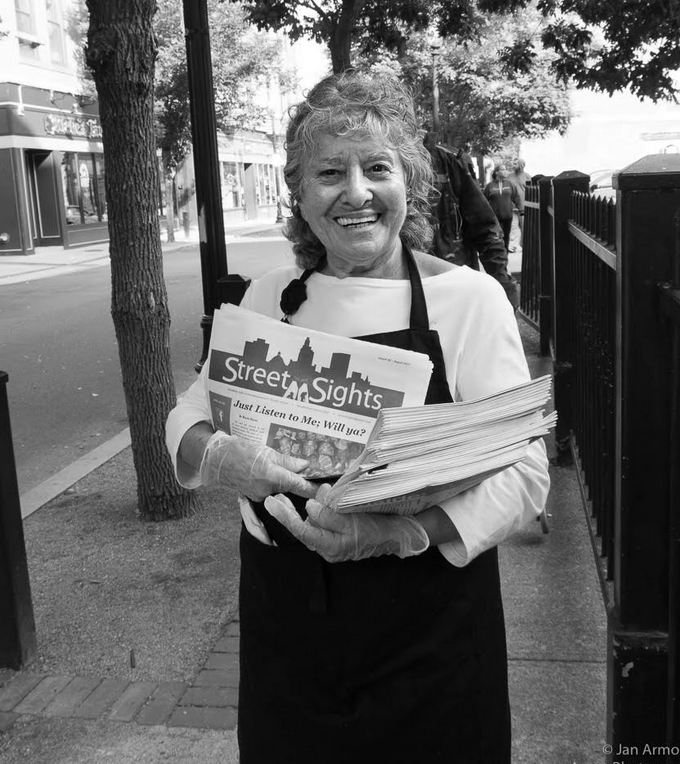Search Posts
Recent Posts
- Rhode Island Weather for May 31, 2025 – Jack Donnelly May 31, 2025
- Burn with Kearns: Fix Your Foundation: Core, Mobility & Joint Health – Kevin Kearns May 31, 2025
- In the News… quick recap of the week’s news (5.31.25) May 31, 2025
- Business Beat: Navigant CU receives prestigious Community Impact Award from NEACH May 31, 2025
- To Do in RI: Taste of Rhode Island. Food, libations, entertainment, auction for Matunuck Oyster Bar May 31, 2025
Categories
Subscribe!
Thanks for subscribing! Please check your email for further instructions.

Homeless in RI: Street Sights and RINewsToday. Unhoused voices – Let’s talk mental health
by Antonietta Kies, contributing writer
Written for, about, and by people who are unhoused or have been unhoused.
We begin our series, Street Sights, literally from the streets, in the voice and on behalf of, people experiencing homelessness in Rhode Island. We thank Janice Luongo, founder and editor of Street Sights, and longtime advocate for people experiencing homelessness.
Today – Let’s talk about Mental health
Street Sights is attempting to give a clear picture of the issue of mental health in general, and with the unhoused. We’ve had lots of experience listening to people who are unhoused. This is the first in a series of articles.
When most people think about mental health, the first thing that comes to mind is psychology: medical terminology, in line with the way we describe something as simple as a broken bone. A vocabulary of diagnoses, medications, and types of medical professionals. But mental health embodies so much more than these things.
It applies to everyone, not just those of us with diagnosable mental illnesses. Let’s face it: life’s challenges can be hard enough on their own. They are all the more difficult to cope with without the emotional and social support that are perhaps the biggest part of our mental health and wellbeing. Everyone needs mental health to function at their best: to not just survive, but to thrive. And shouldn’t we all be given the tools to pursue that goal in life?
In reality, getting access to care is not simple in America. Anyone who’s shopped for a health insurance policy may have noticed that the covered mental health services take the back seat when it comes to available care. Plans that cover “traditional” care such as surgery and infection treatment do not always offer mental health coverage. And because of the exorbitant cost of health insurance in the first place, it can be tempting to deprioritize mental health in the process of choosing a health plan.
At first blush, it may seem that it’s logical to make sure you can afford care for that surgical operation, but not necessarily to have care for the less clearly identifiable mental challenge. The phenomenon can be measured: A 2024 report by USA Today found that 55% of Americans living with mental illness do not receive care[1]. The issue is very much not black and white. Mental health and “physical health” may be similar in some ways, (both can have outward, physical side-effects like headache and fatigue), but they are so different in other ways that they cannot even be compared. Living with a “physical” illness intrinsically comes with a mental cost, for one. Because mental health is the backdrop against which all other life is lived: when our bodies are feeling well, and when they are not.
This brings us to the topic of those experiencing homelessness, where the prevalence of mental health struggles only increases. The trauma of being homeless is so great that if a person did not have a mental illness when housed, they may very well have one now, due to the experience. And in terms of becoming unhoused, the relationship with mental health moves both ways. It is harder to cope with a disabling condition when unhoused. And it is also more likely that someone can become unhoused when dealing with a crippling mental health struggle.
According to MarketWatch, millions of Americans could become homeless from one lost paycheck, which is likely just a fraction of the cost of a medical emergency[2]. Recalling the financial pressure to deprioritize mental health care when choosing an insurance plan, so many Americans find themselves with less mental support than they need, which puts them at increased risk of experiencing a mental health crisis, which could involve a $200 out of pocket therapy session or a thousands-of-dollars hospital visit [3][4].
Up to 30% of those who are homeless have a significant mental illness such as schizophrenia [5], and what’s more, for this particular illness, for example, with a prevalence of just 1% in the general population [6], some studies find it is up to 20% prevalence among unhoused people [7][8]. And of course, without housing security and potentially without transportation, how would a homeless individual be able to physically get to the point of care, let alone afford it?
One positive development on the front of acknowledging non-medical support systems that contribute to the likelihood of receiving care is the adoption of SDOH (Social Determinants of Health) surveys in doctors’ offices. The challenge still remains of what doctors have the power to do to act on the information gathered from SDOH surveys, but they are undeniably a tool that is raising awareness in medical communities of the fact that there is a strong relationship between physical health and social factors, which often include both mental health and housing insecurity.
Let’s discuss
What are your thoughts about how we discuss mental health and assign it value? Stigma is one factor which continues to suppress the public discussion of mental illness. Why should there be stigma when mental health and illness touches us all, whether directly or through a family member, partner, coworker, or friend? And how can this stigma be dismantled in the interest of growing awareness of mental health and of its relationship with homelessness?
We at Street Sights are delving into the issues of mental health regarding the unhoused.
Antonietta Kies is a writer for Street Sights who has put together this article to begin to show some of the many reasons why people who are unhoused have mental health issues. In all of our families we know someone who has struggled with mental illness in some shape or form.

Street Sights can trace its early beginnings to 1999 when a Brown University student doing research on street newspapers, thought the Providence homeless community might be served by such much-needed information, as well as an opportunity for self-expression. It has been published for approximately 16 years, beginning in 2007, as the first magazine written by and for the homeless population. It began as a weekly single sheet of purposeful and inspirational information distributed at agencies and newsstands, in tents, backpacks and the pockets of individuals who are unhoused. It can be found in every community. In recent time it has become a digital format, accessible by anyone using a computer, or cell phone.
Today’s publication with RINewsToday is a way to reach more people – and more audiences – with vital messages from and on behalf of our brothers and sisters.
Street Sights serves as a forum for advocates, unhoused and formerly-unhoused, people, students, state officials, and the general public to share accurate and honest information about issues relating to homelessness.
Readers may leave a note for Street Sights, for Janice, for Antonietta, below:
Or, write to us at news@RINewsToday.com or streetsights@gmail.com
References
[1] https://www.usatoday.com/money/blueprint/health-insurance/mental-health-statistics/
[2] https://www.marketwatch.com/story/most-americans-are-one-paycheck-away-from-the-street-2016-01-06
[3] https://www.psychologytoday.com/us/basics/therapy/cost-and-insurance-coverage
[4] https://www.vox.com/2016/2/11/10952078/mental-health-bankruptcy
[5] https://www.ncbi.nlm.nih.gov/pmc/articles/PMC7525583/
[6] https://www.hopkinsmedicine.org/health/wellness-and-prevention/mental-health-disorder-statistics
[7] https://endhomelessness.org/blog/new-study-offers-hope-for-homeless-people-with-schizophrenia/
[8] https://www.mentalhealth.com/library/schizophrenia-and-homelessness
___

My brother is schizophrenic and homeless. As his family, it id so hard to see him go through this. As hard as it is, you cant give up on them. Keeping your distance is ok, but remember that they aren’t themselves without their meds. 😭. Please look up NAMI, it can help you as a family member. We need support as do they as theres not much we can do when someone doesn’t accept the help. Thank you for this article and thank you Janice and Antonietta .
And what happens if your medical does cover mental/behavior issues and the provider refuses to take it? Good luck finding another provider. One has developed trust in their provider over years only to be told that they will no longer take the golden medical you’ve relied on. Finding someone who actually knows and understands you, is next to impossible. It’s starting from Ground Zero again, reliving everything that you’ve gone through and dealt with.